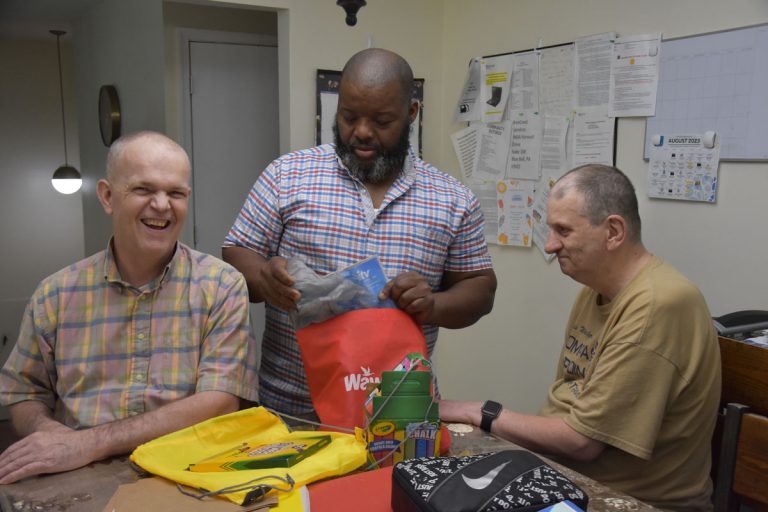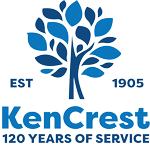Opening the door to KenCrest’s Maule Lane Community Living home, one is greeted with booming laughter, the clanking of dishes in the sink, and boisterous conversation. Four men live in this home, all with an intellectual or developmental disability (IDD).
Through the front door of the split-level home, two men are seated around the dining table, partaking in an activity with two Direct Support Professionals. The other two men are getting ready in their rooms for a day out in the community.
This is a typical day at one of KenCrest’s Community Living Homes. The individuals experience daily activities like doing household chores, participating in group activities, and venturing into the community to run errands, visit museums, and more.
Direct Support Professionals are unlike any other staff in the human services industry. They are not only tasked with supporting the medical, mental, and physical health needs of those with an IDD, but they also help those they serve become integrated with their community, find employment, and live meaningful lives.
However, as human services providers are funded by the State Medicaid Home and Community-Based Services (HCBS), they do not get to dictate the hourly rates for DSPs. As a result, the hourly wage is minimal, resulting in turnover and vacancy rates causing severe issues in staffing homes like Maule Lane.
Why are Direct Support Professionals so vital?
The American Network of Community Options and Resources (ANCOR) states that a Direct Support Professional, or DSP, “delivers essential long-term supports that empower people with intellectual and developmental disabilities (I/DD) to live independently, work in the community, spend their days meaningfully, connect with friends and family, and so much more.”
DSPs at KenCrest are incredibly valued and help support the lives of those in our Community Living Homes. They regularly create close relationships with those they support.

Ali Saccoh has been working for KenCrest for seven years as a Lead DSP because he loves spending time with those he supports and seeing them achieve their goals and live happy lives. One of his favorite memories was taking a trip to Lancaster with the four men he supports and watching as they made memories and experienced new things.
“I love my job, helping out the guys in my home and making sure they achieve their goals,” says Saccoh. “I love taking them out and seeing the happiness on their faces. Recently, Joe went on a date with his girlfriend, and I loved seeing how happy it made him.”
Kelechi Nwaogu, another Lead DSP, works in this field because he understands that every person may need extra help at one point in their life and that there are ways to get that help while still living a fulfilling life. As the son of an Anglican Pastor, he grew up knowing that to give back and support others in need.
“People with IDD are human beings like us and deserve all the same experiences,” he says.
What is the current workforce crisis, and how can you help?
ANCOR’s State of America’s Direct Support Workforce Crisis 2023 report, which garnered responses from 581 district provider organizations, states that 95 percent of human services respondents indicated they had experienced moderate or severe staffing shortages in the past year. Turnover rates are now hovering below 50 percent nationally, with as many as one in eight DSP positions remaining vacant.
The report states, “More than three-fourths (77 percent) of respondents reported turning away new referrals in the past year due to ongoing staffing shortages.”
This, in turn, hurts the individuals with IDD who are supported. Stability is often essential for people with IDD, and with inconsistent staffing, they are suffering.
To combat the staffing shortages happening across the nation, the Case for Inclusion recommends that the 118th Congress “enact legislation to significantly increase the federal share of Medicaid funding for home and community-based services, continue investing in HCBS through the American Rescue Plan Act, urge the U.S. Office of Management & Budget to establish a Standard Occupational Classification for direct support professionals and much more.”
Those interested in helping fight the workforce crisis should engage in opportunities for community partner engagement; state and federal agencies should be encouraged to collect and publicly report on measures related to direct support workforce volume, stability, and compensation; and promote the federal government to expand opportunities for aspiring Americans interested in joining the direct support workforce.










